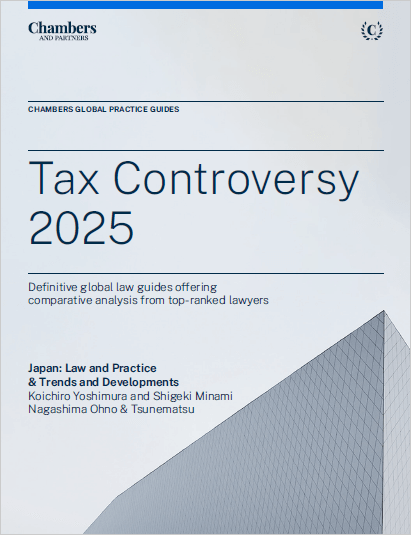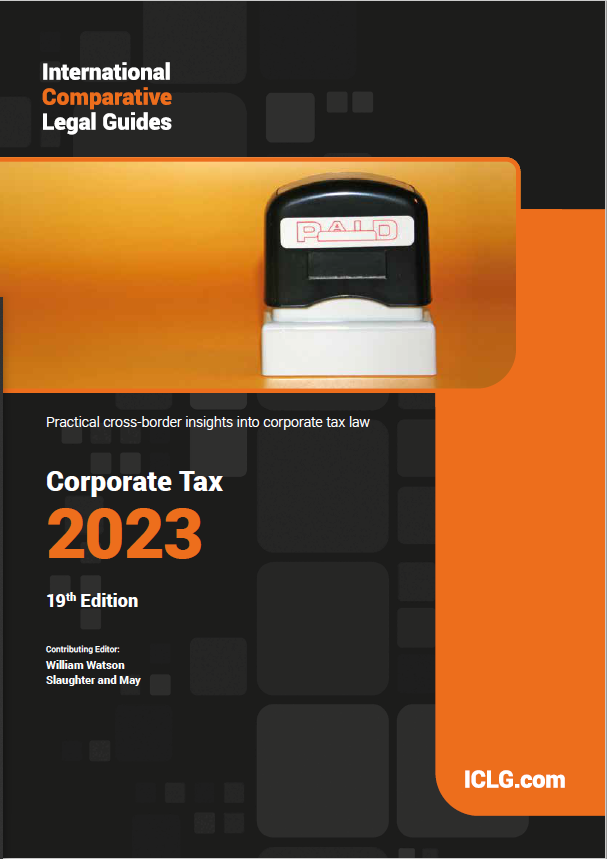The role of tax lawyers in the context of tax disputes is becoming increasingly important, due to the current vigorous enforcement policy of the Japanese tax authority. We are actively engaged in numerous tax dispute cases at every stage of the dispute, including tax audits, administrative appeals, and court proceedings. The greatest strengths and hallmarks of our firm’s tax practice are our ability to successfully resolve disputes at the audit stage without any assessment being issued, and our ability to achieve optimum results for our clients in administrative appeals and litigation by representing and advocating for their best interests.
We have a strong performance record in litigious tax matters, having obtained excellent results in many high-profile tax litigation cases such as:
- A case in which a reassessment issued under the Japanese CFC regime was held to be illegal, by accepting the taxpayer-client’s argument that a legal arrangement involving a Dutch entity, Stichting, constitutes a “trust” for Japanese tax purposes (National Tax Tribunal, Decision on March 14, 2024 (final and binding)).
- A case in which transfer pricing assessments were held to be illegal in favor of the taxpayer with respect to an intangible asset transaction between a Japanese company and its Thai subsidiary (Tokyo District Court, Judgement on December 7, 2023).
- A case in which the denial of the application of the Active Business Exemption test (unrelated party test) for a foreign reinsurance subsidiary under the Anti-Tax Haven Taxation Rules was held to be illegal (Tokyo High Court, Judgement on September 14, 2022, which was later reversed by Supreme Court, Judgment of the First Petty Bench on July 18, 2024).
- A case in which the application of the targeted anti-avoidance rules for closely-held corporations to deny the inclusion of interest on loans of a Japanese subsidiary in deductible expenses related to an international corporate reorganization was held to be illegal (Supreme Court, Judgment of the First Petty Bench on April 21, 2022).
- A case in which the taxation of investment holding gains from FX transactions carried out by a non-resident was held to be illegal (Tokyo District Court, Judgment on March 25, 2022 (final and binding), and substantive judgment on the merits for revocation of administrative disposition by the tax authority (correction for reduction)).
- A case in which transfer pricing assessments were held to be illegal in favor of the taxpayer with respect to a license agreement between a Japanese ceramics manufacturer and its Polish subsidiary (Tokyo High Court, Judgment on March 10, 2022 (final and binding)).
- A case in which the taxation of withholding income tax related to interest payments on bonds issued to foreign banks was held to be illegal on the ground of an error in identifying the taxable entity to which the income should be attributed (Tokyo District Court, Judgement on February 1, 2022 (final and binding)).
- A case in which we successfully represented an individual in obtaining revocation of assessments denying capital losses on the transfer of structured bonds (Tokyo District, Judgment on May 20, 2021 (final and binding))
- A case in which the provisions of the Enforcement Ordinance of the Corporation Tax Act with respect to the distribution of surplus from a foreign subsidiary were held to be illegal and invalid as beyond the scope of the mandate of the Corporation Tax Act (Supreme Court, Judgment of the First Petty Bench on March 11, 2021).
- The A.D. Works case (a case concerning classification of the use of taxable purchases of investment condominiums under the Consumption Tax Act; Tokyo District Court, Judgment on September 3, 2020, which was later reversed by Tokyo High Court, Judgement on July 29, 2021).
- A case in which a reassessment to increase the amount of inheritance tax based on the originally declared value after the division of the estate was denied by reason of the binding force of a judgment cancelling an administrative disposition (Tokyo High Court, Judgment on December 4, 2019, which was later reversed by Supreme Court, Judgment of the First Petty Bench on June 24, 2021).
- A case in which transfer pricing assessments were held to be illegal in favor of the taxpayer with respect to a license agreement between a Japanese motor manufacturer and its Brazilian subsidiary (Tokyo High Court, Judgment on May 13, 2015 (final and binding)).
- The IBM case (a case in which the application of the targeted anti-avoidance rule for closely-held corporations with respect to international corporate reorganizations and losses resulting from the following share buy-back was held to be illegal in favor of the taxpayer; Tokyo High Court, Judgment on March 25, 2015 (final and binding)).
- A case in which denial of the application of the Japan-Ireland tax treaty to distributions of profits from a silent partnership to an investment fund was held to be illegal (Tokyo High Court, Judgment on October 29, 2014 (final and binding)).
- A case concerning the application of the former Article 24 of the Inheritance Tax Act to the right to claim insurance payment of variable amount individual annuities (Tokyo High Court, Judgment on September 24, 2014 (final and binding), Tokyo High Court, Judgment on September 11, 2014 (final and binding).
- A case in which a Bermuda limited partnership was determined not to have a corporate status (Tokyo High Court, Judgment on February 5, 2014 (final and binding)).
- The Kanagawa Prefecture temporary special enterprise tax case (a case in which a tax ordinance enacted by a municipal government was held to be illegal and invalid as violating the provisions of the Local Tax Law; Supreme Court, Judgment of the First Petty Bench on March 21, 2013).
- The Takeda Pharmaceutical Company case (a case in which transfer pricing assessments were held to be illegal in favor of the taxpayer with respect to a license agreement between a Japanese pharmaceutical company and its U.S. joint venture; National Tax Tribunal, Decision on March 18, 2013 (final and binding)).
- A case in which a provision of the Basic Circular on Property Valuation that treated taxpayers disadvantageously with respect to the classification of specified shareholding companies was found to be unreasonable (Tokyo High Court, Judgment on February 28, 2013 (final and binding)).
- A case in which the so-called foreseeability of reassessment was denied with respect to additional tax for under-reporting (Tokyo District Court, Judgment on September 25, 2012 (final and binding)).
- A case in which the timing of deduction expenses for the difference between the acquisition price and face value of receivables in the case of a business transfer by a bank was disputed (Tokyo District Court, Judgment on November 28, 2008 (final and binding)).
- NTT DoCoMo case (a case in which assets owned by a company the aggregate value of which totals several tens of billions JPY were approved as small-amount depreciable assets; Supreme Court, Judgment of the Third Petty Bench on September 16, 2008).
- A case concerning withholding tax on cross-border repo transactions by financial institutions (Tokyo High Court, Judgment on March 12, 2008 (final and binding)).
- A case in which an electric power company was allowed to scrap its thermal power generation facilities (Tokyo District Court, Judgment on January 31, 2007 (final and binding)).
A unique feature of our tax dispute practice is that we are often asked by clients to provide additional representation in tax disputes, even in cases where clients have already appointed other firms, including major firms, because of our extensive experience in tax disputes. We have developed a professional and friendly working relationship with the existing representatives, creating synergy and achieving the best possible results for our clients.
In addition, in the area of transfer pricing, through administrative appeal procedures, we have secured complete cancellations of enormous transfer pricing assessments levied upon a ceramics manufacturer, an automotive manufacturer, and a Japanese pharmaceutical company, as well as a successful resolution of transfer pricing audits for a Japanese electrical products company, a Japanese automobile parts manufacturer, and a luxury brand company, each resulting in no amount of tax being assessed. We also have experience in resolving transfer pricing assessments through bilateral mutual agreement processes. Further, we have acted for various taxpayers, such as manufacturers of automobiles and electric parts, sea carriers and apparels companies in large-scale transfer pricing dispute cases.
In addition, we have been involved in large-scale tax disputes in an area in which there are few precedents, such as those involving reorganization transactions, anti-tax haven regimes and so-called general anti-avoidance statutes.
We also assist Japanese companies in resolving their tax disputes as favorably as possible in key jurisdictions worldwide, particularly in emerging countries in Asia and Africa, through developing dispute resolution strategies, working with local professionals, and facilitating communications with Japanese parent companies.
Highlights of our accomplishments in these tax disputes and matters include the following:
- A case in which the tax assessment on a Korean subsidiary of a Japanese company was reversed based on the Korean tax authorities’ interpretation that the denominator of the shareholding ratio of a parent-subsidiary dividend distribution (from Korea to Japan) under the Japan-Korea tax treaty should include the treasury stock of the Korean subsidiary (Supreme Court of Korea, Judgment in 2017).
- A case in which the imposition of Kenyan Value Added Tax (VAT) on the representative office of a Japanese company in Kenya was reversed (Kenya Tax Appeal Tribunal, Ruling in 2021).
- A case in which we successfully represented the Korean subsidiary of a Japanese manufacturer in obtaining the revocation of customs reassessments made on the importation of goods from Japan (Supreme Court of Korea, Judgment in 2019).
- A case in which a Japanese company’s appeal against a tax assessment by the Australian Tax Office was upheld, and the assessment was reversed (appeal against an assessment of the Australian Tax Office, 2012).
- A case in which a Japanese company challenged a tax assessment in connection with being deemed a permanent establishment (PE) in Tanzania, and the assessment was reversed (reversal of taxation assessment of the Tanzania Revenue Authority, 2019).















